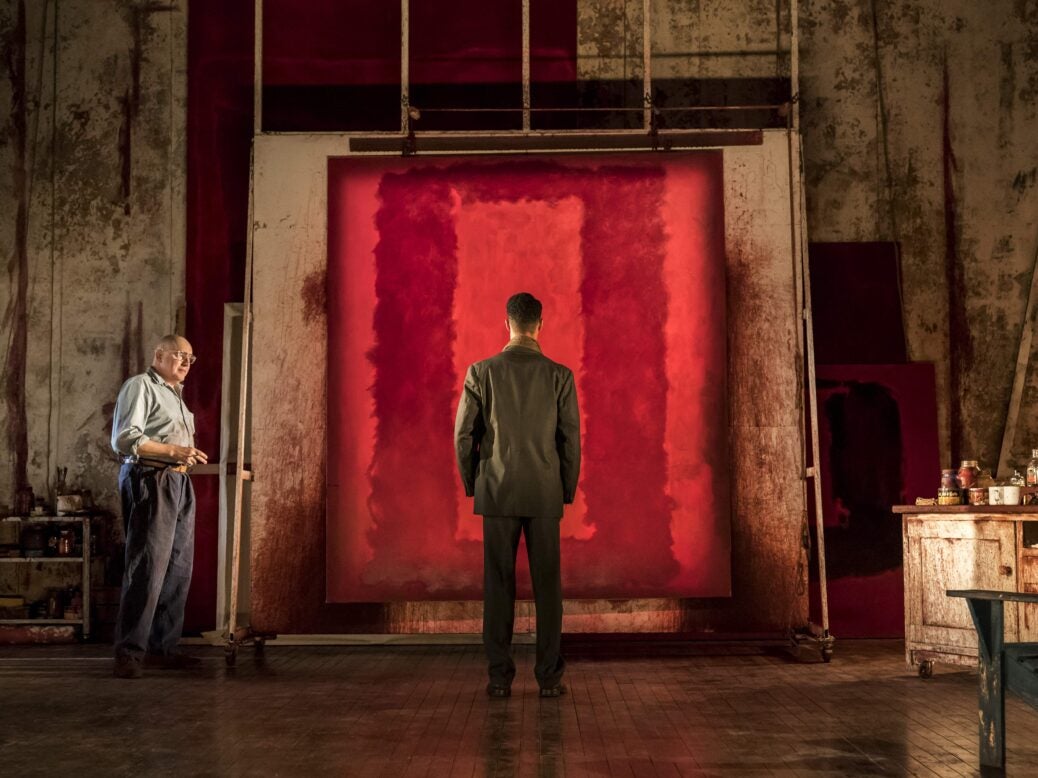
Alfred Molina dazzles as Marc Rothko in the revival of John Logan’s play at the Wyndham, writes Arun Kakar
Heady, striking and intense, Michael Grandage’s new production of playwright John Logan’s Red — a play about the life of Marc Rothko — is as ambivalent about its subject as it is provocative.
The play begins with the commission Rothko received in 1958 to provide paintings for the new Four Seasons on Park Avenue provides the backdrop for the production. The ‘belly of the beast,’ as Simon Schama put it, was an unusual venue for the artist, whose deep, moody use of colour appeared seemingly at odds with the venue’s decadence.
Rothko – who had never before designed a co-ordinated series of works – is uncomfortable with the commission, but arrogant and self-assured, as he lectures to his (fictionalised) young assistant Ken in his New York studio. Ken, a chirpy art school graduate, at first is in awe of the artist’s presence, and duly listens for much of the show as Rothko waxes grandiose statements on mortality, philosophy, life and of course, art.
The discussions evolve as a looming question emerges to confront Rothko: was the great artist, with pop art chasing at the heels, selling out? Red is a play of debate, a taut 90 minutes staged entirely around by Rothko’s imposing canvases, that are moved around throughout. Indeed, we get a representation of the artist as egotist here that often veers to an extreme degree in some of the more extended lectures we are privy to. A reference to Nietzsche, for instance, seems more contrived than inspired — maybe that’s the point.
Alfred Molina, best known for parts in Spider-Man 2 and Chocolat, played the artist at the Donmar Warehouse in 2009 reprises the role and is joined by Alfred Enoch as Ken, originally portrayed by Eddie Redmayne. Molina’s performance is brilliant: his Rothko is rendered with weightiness and melancholy that he is able to convey even when he is not facing the audience, whilst he spits his lines with an engrossing casualness – no mean feat considering some of the stodgy diatribes that the Roth script forces him through.
Enoch’s light-footed performance might not scoop the awards that Redmayne’s portrayal did nine years ago, but he comes into his own as Ken grows increasingly frustrated with the Rothko’s obsessions with anguish and darkness. ‘Not every painting has to rip your guts out and expose your soul!’ he cries in a particularly memorable sequence in which the assistant’s rage is brilliantly uncorked. Rothko – ignorant of the world outside his studio and too self-obsessed to see the cliché he has become – might just be out of touch, and Enoch energetically exposes these contradictions in the third act, much to the joy (or relief) of the audience. The tirade results in Rothko pulling out of the commission and firing Ken, and leaving us to deal with the fallout. It left me wondering why we hadn’t been privy to this boldness sooner.
Congenial on the whole, Red oscillates between nuanced and heavy handed in its treatment of its themes, with allusions to Rothko’s suicide and Ken’s backstory falling into the latter category. It is, however, a mostly playful muse on what made the great painter so enigmatic, (why did he, knowing the type of restaurant the Four Season’s was, ever take the commission in the first place?) and is occasionally profound. Just don’t expect answers.
Red is at the Wyndham Theatre , WC2H
Arun Kakar writes for Spear’s








